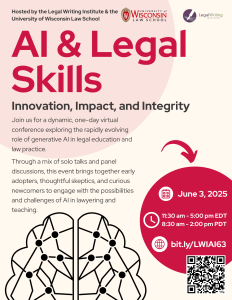
Hosted by the Legal Writing Institute’s AI Committee and the University of Wisconsin Law School
Join the Legal Writing Institute’s AI Committee for a dynamic, one-day online event exploring the evolving role of generative AI in legal education and practice. This event offers a unique opportunity to connect with colleagues across the spectrum of experience—from early adopters to AI skeptics—who are ready to engage in thoughtful dialogue, collaborative exploration, and forward-thinking innovation.
This event is designed to spark conversation and community around AI’s implications for lawyering skills. Through solo presentations, panels, demonstrations, and discussion-based sessions, we’ll address timely topics such as:
- Teaching research, analysis, writing, and revising in the AI era
- Developing learning outcomes and assessments that reflect new capabilities
- Maintaining ethical and professional standards in a changing landscape
- Supporting access to justice through innovative technologies
- Collaborating with students, employers, and allied professionals
 Whether you’re experimenting with ChatGPT in the classroom, rethinking your learning outcomes, or simply curious about what’s next, you’re welcome here. We’ve intentionally kept the registration fee low to foster broad participation across the LWI community.
Whether you’re experimenting with ChatGPT in the classroom, rethinking your learning outcomes, or simply curious about what’s next, you’re welcome here. We’ve intentionally kept the registration fee low to foster broad participation across the LWI community.
 Don’t miss this chance to help shape the future of legal education and lawyering in the age of AI.
Don’t miss this chance to help shape the future of legal education and lawyering in the age of AI.
Schedule - June 3, 2025
The AI & Legal Skills Virtual Conference will be held on Tuesday, June 3, 2025. The current schedule is below.
10:30 a.m. CDT
(8:30 a.m. PDT)
Welcome
LWI AI Conference Committee members Margie Alsbrook, Rebekah Hanley, Desmund Wu (10 min.)
"Breaking the Pedagogical Paradigm: Transformative Approaches to Legal Writing in an AI-Centric Future"
Presenters: Kirsten Davis, Susan Tanner, Carolyn Williams (40 min.)
Moderator: Rebekah Hanley
10-Minute Break
11:30 a.m. CDT
(9:30 a.m. PDT)
Incorporating Student Reflections as Part of GAI-Assisted Legal Research and Writing Assignments
Presenter: Wendy Garewal (20 min.)
Materials: Documentation of Use of GAI Tool (PDF), Presentation Slides (PDF)
Mind the Gap: Creative Coherence in AI Generated Legal Writing
Presenter: Justin Kishbaugh (20 min.)
Using AI Thoughtfully in Legal Writing: Insights from the Classroom
Presenter: Alison Julien (20 min.)
Materials: PowerPoint Presentation (PPTX)
15-Minute Break
12:45 p.m. CDT
(10:45 a.m. PDT)
An Empirical Examination of Student Attitudes Toward Drafting with AI
Presenter: Abby Perdue (20 min.)
Looking Beyond Mata: Surveying Judicial Responses to Generative AI in Legal Practice
Presenter: Yan Slavinskiy (20 min.)
Materials: PowerPoint Presentation (PPTX)
No Need to Log in to Lexis or Westlaw? What General-Purpose Generative AI Tools Can Do Now for Anyone Including Student Legal Researchers and Legal CREAC Writers
Presenter: Bill Chin, Rob Truman (20 min.)
Materials: Prompt Document (DOCX), Presentation Slides (PDF), Presentation Slides (Google)
20-Minute Break
2:05 p.m. CDT
(12:05 p.m. PDT)
Navigating Bias in Generative AI
Presenter: Melissa Weresh (20 min.)
Teaching Hallucinations
Presenter: Jaclyn Celebrezze (5 min.)
How to Talk with Students You Suspect May Have Used AI Improperly
Presenter: Misti Duvall (20 min.)
Materials: Presentation Slides (PDF)
Beyond Briefs: Adding GenAI Assignments to Your Spring Persuasive Writing Problem
Presenter: Jonathan J. Sheffield (5 min.)
Materials: PowerPoint Presentation (PPTX)
15-Minute Break
3:10 p.m. CDT
(1:10 p.m. PDT)
Expanding the Scope: Exploring Topics in AI Scholarship and Legal Writing
Presenter: Kimberly Holst (5 min.)
Creating Attorney Advertisements: An Opportunity for Students to Use AI
Presenter: John Cook (5 min.)
Leveraging AI-Assisted Contract Drafting for Social Good
Presenter: Susan Chesler (20 min.)
Materials: PowerPoint Presentation (PPTX)
Teaching Students About the Use of AI for Interpretation/Translation Services in the Legal Setting
Presenter: Ericka Curran (5 min.)
Using AI to Prepare for Moot Court
Presenter: Jayne Woods (20 min.)
Materials: PowerPoint Presentation (PPTX)
4:05 p.m. CDT
(2:05 p.m. PDT)
Brief Closing Remarks
LWI AI Conference Committee members Margie Alsbrook, Rebekah Hanley, Desmund Wu (10 min.)
Presenters
Learn more about the virtual conference presenters.
Jaclyn Celebrezze
 Jaclyn Celebrezze is an Assistant Teaching Professor at the University of Washington School of Law. She regularly writes and presents on issues of hidden curriculum, emerging legal pedagogy, and professional development. Before beginning her teaching career six years ago, she practiced for several years in employment-based immigration law.
Jaclyn Celebrezze is an Assistant Teaching Professor at the University of Washington School of Law. She regularly writes and presents on issues of hidden curriculum, emerging legal pedagogy, and professional development. Before beginning her teaching career six years ago, she practiced for several years in employment-based immigration law.
Sue Chesler
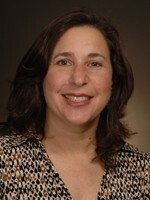 Professor Sue Chesler teaches Legal Method and Writing, Legal Advocacy, and Contract Drafting at Arizona State University Sandra Day O’Connor College of Law. Her scholarship primarily focuses on the intersection of applied legal storytelling and transactional drafting. She is also currently examining the impact of generative artificial intelligence on contract drafting and how law schools need to prepare students for transactional practice.
Professor Sue Chesler teaches Legal Method and Writing, Legal Advocacy, and Contract Drafting at Arizona State University Sandra Day O’Connor College of Law. Her scholarship primarily focuses on the intersection of applied legal storytelling and transactional drafting. She is also currently examining the impact of generative artificial intelligence on contract drafting and how law schools need to prepare students for transactional practice.
Bill Chin
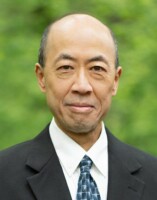 Prof. Bill Chin is a co-leader of the Strategic Plan Subcommittee within the Legal Writing Institute’s Artificial Intelligence (AI) Committee and a member of the Legal Writing and Generative AI Convo Group. Bill teaches Lawyering, Veterans Law, and Race and the Law at Lewis & Clark Law School.
Prof. Bill Chin is a co-leader of the Strategic Plan Subcommittee within the Legal Writing Institute’s Artificial Intelligence (AI) Committee and a member of the Legal Writing and Generative AI Convo Group. Bill teaches Lawyering, Veterans Law, and Race and the Law at Lewis & Clark Law School.
John Cook
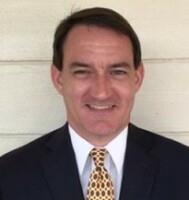 John Cook teaches Research, Writing & Analysis I and II at the University of Arkansas at Little Rock William H. Bowen School of Law. He is also the Director of the Rural Practice Incubator Project and an affiliated faculty member with the Center for Criminal Justice and Racial Justice Reform. In 2025, he received both the law school and the university’s Faculty Excellence Awards for Rising Faculty.
John Cook teaches Research, Writing & Analysis I and II at the University of Arkansas at Little Rock William H. Bowen School of Law. He is also the Director of the Rural Practice Incubator Project and an affiliated faculty member with the Center for Criminal Justice and Racial Justice Reform. In 2025, he received both the law school and the university’s Faculty Excellence Awards for Rising Faculty.
Before joining the Bowen faculty, Professor Cook taught for two years as a Legal Method and Communication Fellow at Elon University School of Law and for two years as a Visiting Assistant Professor of Law at the University of North Dakota School of Law. He also taught in an adjunct capacity at both Charlotte School of Law and Northern Marianas College. He serves as a member of the editorial board of Legal Writing: The Journal of the Legal Writing Institute.
Ericka Curran
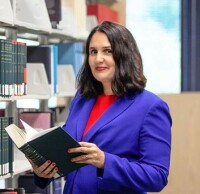 Ericka Curran is an Associate Professor of Professional Skills and the Director of the Leadership Honors Program at the University of Dayton School of Law.
Ericka Curran is an Associate Professor of Professional Skills and the Director of the Leadership Honors Program at the University of Dayton School of Law.
Professor Curran received her law degree from Seattle University School of Law and went on to practice Immigration Law. Professor Curran has served on the Board of Directors of the American Immigration Lawyers Association Central Florida Chapter and has chaired numerous committees. Professor Curran also served on the Executive Committee for the North East Florida Human Trafficking Coalition and also served on the City of Jacksonville’s Mayor’s Victim Assistance Advisory Council. Before joining UDSL, Professor Curran was the Director of Experiential Learning at Florida Coastal School of Law. In practice, Professor Curran's practice focuses on the representation of detained immigrants, immigrant children, immigrant survivors of violent crime and human trafficking victims. Professor Curran has worked in the US and abroad on migration and refugee issues.
Kirsten Davis
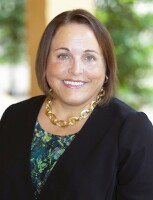 Dr. Kirsten Davis is a Professor of Law and the Provost's Fellow for Generative AI and Higher Education at Stetson University College of Law where she teaches legal writing, professional responsibility, First Amendment, and courses at the intersection of legal communication and generative AI. Her current scholarship explores generative AI’s impact on legal education and practice. Kirsten founded and facilitates the Legal Writing and Generative AI Convo Group. She is a frequent speaker on generative AI, law practice, and legal education.
Dr. Kirsten Davis is a Professor of Law and the Provost's Fellow for Generative AI and Higher Education at Stetson University College of Law where she teaches legal writing, professional responsibility, First Amendment, and courses at the intersection of legal communication and generative AI. Her current scholarship explores generative AI’s impact on legal education and practice. Kirsten founded and facilitates the Legal Writing and Generative AI Convo Group. She is a frequent speaker on generative AI, law practice, and legal education.
Misti Duvall
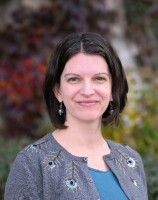 Misti Duvall is the writing specialist at Columbia Law School, where she provides one-on-one instruction to help students develop legal writing skills, designs and teaches legal writing workshops, creates legal writing education materials, and supervises the Writing Center’s student writing fellows. She has also served as a 1L writing support specialist at Brooklyn Law School and taught First-Year Legal Writing at Fordham Law School. Prior to transitioning into education, Misti spent a decade practicing environmental and human rights law in the U.S. and Southeast Asia.
Misti Duvall is the writing specialist at Columbia Law School, where she provides one-on-one instruction to help students develop legal writing skills, designs and teaches legal writing workshops, creates legal writing education materials, and supervises the Writing Center’s student writing fellows. She has also served as a 1L writing support specialist at Brooklyn Law School and taught First-Year Legal Writing at Fordham Law School. Prior to transitioning into education, Misti spent a decade practicing environmental and human rights law in the U.S. and Southeast Asia.
Wendy Garewal
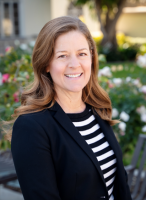 Wendy Garewal is a Professor of Legal Writing at the University of San Diego School of Law, where she has been teaching legal writing and research for 15 years. She also serves as the Academic Director of the Legal Writing and Research Program. Prior to joining the law school, she practiced law in San Diego where she advised commercial and residential developers on complex real estate matters including common interest development issues. She earned her JD from the University of Southern California Gould School of Law and her MA and BA from Stanford University.
Wendy Garewal is a Professor of Legal Writing at the University of San Diego School of Law, where she has been teaching legal writing and research for 15 years. She also serves as the Academic Director of the Legal Writing and Research Program. Prior to joining the law school, she practiced law in San Diego where she advised commercial and residential developers on complex real estate matters including common interest development issues. She earned her JD from the University of Southern California Gould School of Law and her MA and BA from Stanford University.
Kimberly Holst
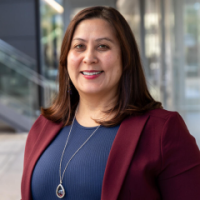 Kimberly Holst is a Clinical Professor of Law at the Sandra Day O’Connor College of Law at Arizona State University. She is the Immediate Past President of the Legal Writing Institute and has served as Chair of the Association of American Law Schools Section on Teaching Methods and the Section on Legal Writing, Reasoning, and Research. Professor Holst teaches Legal Method and Writing as well as upper-level writing and skills courses at ASU. Professor Holst’s scholarship examines the intersection of law and media—particularly how media impacts public understanding of law or legal issues.
Kimberly Holst is a Clinical Professor of Law at the Sandra Day O’Connor College of Law at Arizona State University. She is the Immediate Past President of the Legal Writing Institute and has served as Chair of the Association of American Law Schools Section on Teaching Methods and the Section on Legal Writing, Reasoning, and Research. Professor Holst teaches Legal Method and Writing as well as upper-level writing and skills courses at ASU. Professor Holst’s scholarship examines the intersection of law and media—particularly how media impacts public understanding of law or legal issues.
Alison Julien
 Alison Julien is a Professor of Legal Writing at Marquette University Law School, where she has taught for twenty-five years. Her scholarship and teaching focus on legal writing pedagogy, curriculum design, and the integration of GenAI technologies into legal education. Most recently, she developed and taught Advanced Legal Writing: AI, a course that explores how generative AI tools can assist with conceptualizing, drafting, evaluating, and transforming legal documents.
Alison Julien is a Professor of Legal Writing at Marquette University Law School, where she has taught for twenty-five years. Her scholarship and teaching focus on legal writing pedagogy, curriculum design, and the integration of GenAI technologies into legal education. Most recently, she developed and taught Advanced Legal Writing: AI, a course that explores how generative AI tools can assist with conceptualizing, drafting, evaluating, and transforming legal documents.
Justin Kishbaugh
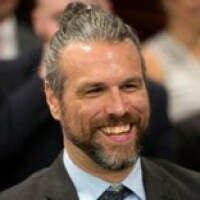 Justin Kishbaugh is the Associate Director of Academic Success, Director of the Writing Center, and a Professor of Writing at Roger Williams University School of Law in Bristol, RI. He has taught legal writing at Roger Williams University School of Law, Duquesne University School of Law, and the University of Pittsburgh. He is also Co-Editor-in-Chief of the Journal of Maritime Law and Commerce housed at RWU Law, and the Bloomberg Law School Innovation Program awarded him an Honorable Mention in 2024 for his work with the Writing Center at RWU Law and its “Tip of the Week” series.
Justin Kishbaugh is the Associate Director of Academic Success, Director of the Writing Center, and a Professor of Writing at Roger Williams University School of Law in Bristol, RI. He has taught legal writing at Roger Williams University School of Law, Duquesne University School of Law, and the University of Pittsburgh. He is also Co-Editor-in-Chief of the Journal of Maritime Law and Commerce housed at RWU Law, and the Bloomberg Law School Innovation Program awarded him an Honorable Mention in 2024 for his work with the Writing Center at RWU Law and its “Tip of the Week” series.
Abigail Perdue
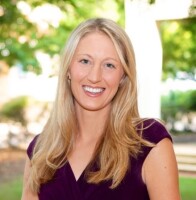 Abigail Perdue is a Professor of Law at Wake Forest University School of Law. In 2024, she became President of the Legal Writing Institute after serving for two years as President-Elect. In 2021, Professor Perdue received the Joseph Branch Award in Teaching Excellence. She teaches various courses, including Legal Writing, Appellate Advocacy, and Judicial Clerking. She is also the Founding Director of the D.C. Summer Judicial Externship Program. Professor Perdue has published numerous books, law review articles, and scholarly essays on diverse topics, including The All-Inclusive Guide to Judicial Clerking as well as Employment Discrimination: A Practical Skills Guide and Learning Lab Manual. Professor Perdue also serves on LWI's Executive Committee, Election Committee, Institutional Memory Working Group, and Finance Committee. She has previously served as Co-Chair of LWI's 2022 Biennial Conference, Co-Chair of LWI's New Member Outreach Committee, Co-Editor-in-Chief of The Second Draft, and as a contributing writer for LWI Lives. Prior to joining the faculty at Wake Forest, Professor Perdue practiced employment law at the New York City office of Proskauer Rose, LLP, taught at Washington and Lee University, and clerked at the United States Court of Federal Claims as well as the United States Court of Appeals for the Federal Circuit. Professor Perdue graduated summa cum laude from Washington and Lee University and obtained her law degree from the University of Virginia School of Law.
Abigail Perdue is a Professor of Law at Wake Forest University School of Law. In 2024, she became President of the Legal Writing Institute after serving for two years as President-Elect. In 2021, Professor Perdue received the Joseph Branch Award in Teaching Excellence. She teaches various courses, including Legal Writing, Appellate Advocacy, and Judicial Clerking. She is also the Founding Director of the D.C. Summer Judicial Externship Program. Professor Perdue has published numerous books, law review articles, and scholarly essays on diverse topics, including The All-Inclusive Guide to Judicial Clerking as well as Employment Discrimination: A Practical Skills Guide and Learning Lab Manual. Professor Perdue also serves on LWI's Executive Committee, Election Committee, Institutional Memory Working Group, and Finance Committee. She has previously served as Co-Chair of LWI's 2022 Biennial Conference, Co-Chair of LWI's New Member Outreach Committee, Co-Editor-in-Chief of The Second Draft, and as a contributing writer for LWI Lives. Prior to joining the faculty at Wake Forest, Professor Perdue practiced employment law at the New York City office of Proskauer Rose, LLP, taught at Washington and Lee University, and clerked at the United States Court of Federal Claims as well as the United States Court of Appeals for the Federal Circuit. Professor Perdue graduated summa cum laude from Washington and Lee University and obtained her law degree from the University of Virginia School of Law.
Jonathan J. Sheffield
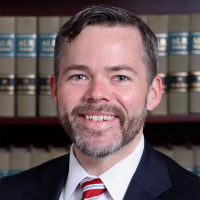 Jonathan J. Sheffield serves as a clinical assistant professor teaching legal writing and other courses in his areas of expertise. Previously he worked as an adjunct professor while he practiced full-time at the Illinois Attorney General's Office in the civil appeals division. As an adjunct, Mr. Sheffield taught legal writing and administrative law to first- and second-year law students at Loyola University Chicago, DePaul University, and the University of Illinois Chicago.
Jonathan J. Sheffield serves as a clinical assistant professor teaching legal writing and other courses in his areas of expertise. Previously he worked as an adjunct professor while he practiced full-time at the Illinois Attorney General's Office in the civil appeals division. As an adjunct, Mr. Sheffield taught legal writing and administrative law to first- and second-year law students at Loyola University Chicago, DePaul University, and the University of Illinois Chicago.
At the Illinois Attorney General's Office, Mr. Sheffield represented state officials and agencies in federal and state appellate courts of all levels, including the Supreme Court of the United States. He orally argued 11 cases and drafted over 40 briefs and dispositive motions in the U.S. Court of Appeals for the Seventh Circuit and Illinois Appellate Court. His cases presented a variety of issues, including constitutional questions (First, Fourth, Eighth, and Fourteenth Amendments), administrative law, appellate and subject-matter jurisdiction, appellate and civil procedure, federalism principles, governmental immunities, state executive authority during emergencies like the Covid-19 pandemic, environmental issues including fracking and coal ash pollution, regulatory takings, and eminent domain.
After law school, Mr. Sheffield worked as a staff law clerk for the U.S. Court of Appeals for the Seventh Circuit, and as a clerk for the Honorable Robert C. Chambers on the U.S. District Court for the Southern District of West Virginia.
In law school, Mr. Sheffield concentrated on public interest work in the areas of affordable and fair housing, publishing articles on those topics and interning at the Fair Housing and Equal Opportunity Office of the U.S. Department of Housing and Urban Development, Legal Aid Chicago (formerly LAF), Equip for Equality, and Loyola's Health Justice Project.
Before law school, Mr. Sheffield served two years in the Jesuit Volunteer Corps in New York City and Portland, Maine, working with people experiencing homelessness, living with HIV/AIDS, and facing other social justice issues.
Yan Slavinskiy
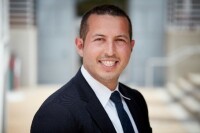 Yan Slavinskiy is an Associate Clinical Professor at LMU Loyola Law School (Los Angeles), where he teaches legal writing, ethical lawyering, and a new course on incorporating generative artificial intelligence in legal practice. Before joining Loyola’s faculty, he clerked for federal judges in the Southern District of New York and Central District of California and served as an assistant district attorney in the Appeals Division of the Manhattan District Attorney’s Office. A first-generation college and law-school graduate raised with English as a second language, Professor Slavinskiy brings this perspective to his teaching and scholarship. He has presented at regional and national legal writing conferences on generational learning differences, generative artificial intelligence, and ways to address the law’s relationship to systemic inequality in the classroom.
Yan Slavinskiy is an Associate Clinical Professor at LMU Loyola Law School (Los Angeles), where he teaches legal writing, ethical lawyering, and a new course on incorporating generative artificial intelligence in legal practice. Before joining Loyola’s faculty, he clerked for federal judges in the Southern District of New York and Central District of California and served as an assistant district attorney in the Appeals Division of the Manhattan District Attorney’s Office. A first-generation college and law-school graduate raised with English as a second language, Professor Slavinskiy brings this perspective to his teaching and scholarship. He has presented at regional and national legal writing conferences on generational learning differences, generative artificial intelligence, and ways to address the law’s relationship to systemic inequality in the classroom.
Susan Tanner
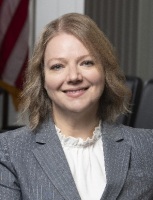 Dr. Susan Tanner is an Associate Professor of Law at the University of Louisville Brandeis School of Law, where she teaches Lawyering Skills and AI and the Law. With a Ph.D. in Rhetoric from Carnegie Mellon and a J.D. from Indiana University, her scholarship focuses on how language, technology, and law intersect in the digital age. She has published and presented widely on generative AI, machine learning bias, and ethical legal writing. A former privacy policy researcher at CMU’s CyLab and an AW Mellon digital humanities fellow, Dr. Tanner brings both empirical insight and classroom experience to questions of AI and legal education.
Dr. Susan Tanner is an Associate Professor of Law at the University of Louisville Brandeis School of Law, where she teaches Lawyering Skills and AI and the Law. With a Ph.D. in Rhetoric from Carnegie Mellon and a J.D. from Indiana University, her scholarship focuses on how language, technology, and law intersect in the digital age. She has published and presented widely on generative AI, machine learning bias, and ethical legal writing. A former privacy policy researcher at CMU’s CyLab and an AW Mellon digital humanities fellow, Dr. Tanner brings both empirical insight and classroom experience to questions of AI and legal education.
Rob Truman
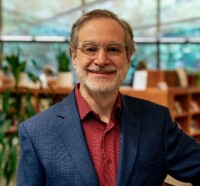 Rob Truman, Associate Professor of Law, is Associate Dean and Director of the Paul L. Boley Law Library. Rob has taught a variety of legal research classes since 1999, and is currently teaching Legal Research: Environmental Law. Prior to becoming Director Rob served as Librarian for Legal Research Instruction; Assistant Director, Electronic Information Services; Reference Librarian; and Assistant Dean for Continuing Legal Education and Director, Oregon Law Institute. He has a J.D. from Lewis & Clark Law School and an M.L.S. from Emporia State University. Before coming to LC Law he was in private practice and was a Reference Librarian at the Willamette University College of Law.
Rob Truman, Associate Professor of Law, is Associate Dean and Director of the Paul L. Boley Law Library. Rob has taught a variety of legal research classes since 1999, and is currently teaching Legal Research: Environmental Law. Prior to becoming Director Rob served as Librarian for Legal Research Instruction; Assistant Director, Electronic Information Services; Reference Librarian; and Assistant Dean for Continuing Legal Education and Director, Oregon Law Institute. He has a J.D. from Lewis & Clark Law School and an M.L.S. from Emporia State University. Before coming to LC Law he was in private practice and was a Reference Librarian at the Willamette University College of Law.
Mel Weresh
 Melissa H. Weresh is a Dwight D. Opperman Distinguished Professor of Law and the Herb and Karen Baum Chair of Ethics in the Profession at Drake University Law School. Professor Weresh is the 2017 Thomas F. Blackwell Memorial Award for Outstanding Achievement in the Field of Legal Writing and the 2023 Linda Berger Lifetime Achievement Award for Excellence in Legal Writing Scholarship. She is a Past President of the Legal Writing Institute, Past Chair of the AALS Section on Teaching Methods, and Past Chair of the Professionalism Section of the Iowa Bar Association. She is also past editor of both the Journal of Legal Education and Legal Communication and Rhetoric: JALWD. Her scholarly interests range from politics to professionalism, and from persuasion to pedagogy. Prior to joining the Drake law faculty, she practiced law in Ohio, specializing in environmental law. Professor Weresh received her J.D. from the University of Iowa and her B.A. from Wake Forest University.
Melissa H. Weresh is a Dwight D. Opperman Distinguished Professor of Law and the Herb and Karen Baum Chair of Ethics in the Profession at Drake University Law School. Professor Weresh is the 2017 Thomas F. Blackwell Memorial Award for Outstanding Achievement in the Field of Legal Writing and the 2023 Linda Berger Lifetime Achievement Award for Excellence in Legal Writing Scholarship. She is a Past President of the Legal Writing Institute, Past Chair of the AALS Section on Teaching Methods, and Past Chair of the Professionalism Section of the Iowa Bar Association. She is also past editor of both the Journal of Legal Education and Legal Communication and Rhetoric: JALWD. Her scholarly interests range from politics to professionalism, and from persuasion to pedagogy. Prior to joining the Drake law faculty, she practiced law in Ohio, specializing in environmental law. Professor Weresh received her J.D. from the University of Iowa and her B.A. from Wake Forest University.
Carolyn V. Williams
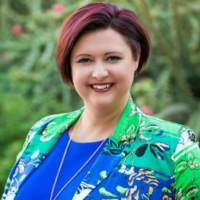 Carolyn V. Williams is an Assistant Professor of Law at the University of North Dakota School of Law, where she teaches legal writing and research with a focus on innovation and pedagogy. Her current scholarship and teaching explore how generative AI is reshaping legal education, with particular attention to assessment, student learning, and bar exam preparation. Carolyn is the co-founder and facilitator of the nationwide Legal Writing and Generative AI Convo Group. In addition to frequently speaking on AI in legal education, she was a legal research subject matter expert on the NextGen Bar Exam and serves on the North Dakota Supreme Court NextGen Bar Exam Subcommittee and the North Dakota Legislature’s AI subcommittee.
Carolyn V. Williams is an Assistant Professor of Law at the University of North Dakota School of Law, where she teaches legal writing and research with a focus on innovation and pedagogy. Her current scholarship and teaching explore how generative AI is reshaping legal education, with particular attention to assessment, student learning, and bar exam preparation. Carolyn is the co-founder and facilitator of the nationwide Legal Writing and Generative AI Convo Group. In addition to frequently speaking on AI in legal education, she was a legal research subject matter expert on the NextGen Bar Exam and serves on the North Dakota Supreme Court NextGen Bar Exam Subcommittee and the North Dakota Legislature’s AI subcommittee.
Jayne Woods
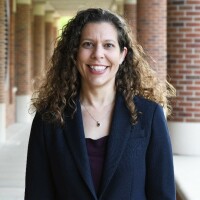 Professor Jayne Woods teaches primarily first-year legal writing courses. She began teaching at Mizzou Law as an adjunct in 2007 and joined the faculty full-time in Fall 2022. In addition to her current courses, she has taught Appellate Advocacy, Moot Court I, and Moot Court II. She is also a regular contributor to the Appellate Advocacy Blog. Professor Woods has been (and continues to be) a law clerk for the Honorable Karen King Mitchell on the Missouri Court of Appeals, Western District, since 2011. Before that, she was an Assistant Attorney General for the Missouri Attorney General’s Office in the Criminal Appeals Division, where she wrote and submitted approximately 400 appellate briefs and argued multiple cases before each district of the Missouri Court of Appeals, as well as the Missouri Supreme Court. She has also served as both a Court Appointed Special Advocate for children in Missouri’s Thirteenth Judicial Circuit and a member of the local Citizens Police Review Board.
Professor Jayne Woods teaches primarily first-year legal writing courses. She began teaching at Mizzou Law as an adjunct in 2007 and joined the faculty full-time in Fall 2022. In addition to her current courses, she has taught Appellate Advocacy, Moot Court I, and Moot Court II. She is also a regular contributor to the Appellate Advocacy Blog. Professor Woods has been (and continues to be) a law clerk for the Honorable Karen King Mitchell on the Missouri Court of Appeals, Western District, since 2011. Before that, she was an Assistant Attorney General for the Missouri Attorney General’s Office in the Criminal Appeals Division, where she wrote and submitted approximately 400 appellate briefs and argued multiple cases before each district of the Missouri Court of Appeals, as well as the Missouri Supreme Court. She has also served as both a Court Appointed Special Advocate for children in Missouri’s Thirteenth Judicial Circuit and a member of the local Citizens Police Review Board.
LWI AI Conference Committee
Learn more about the conference host committee members.
Margie Alsbrook
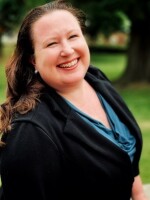 Margie Alsbrook is an Assistant Professor of Law at Mercer University School of Law, where she teaches legal writing, agricultural law and civil procedure. She holds a J.D. and an LL.M. (Master of Laws) in food and agricultural law from the University of Arkansas School of Law where she was the founding editor-in-chief of the Journal of Food Law & Policy.
Margie Alsbrook is an Assistant Professor of Law at Mercer University School of Law, where she teaches legal writing, agricultural law and civil procedure. She holds a J.D. and an LL.M. (Master of Laws) in food and agricultural law from the University of Arkansas School of Law where she was the founding editor-in-chief of the Journal of Food Law & Policy.
Margie has over almost two decades of practice experience, and before joining the legal academy she worked on national food & agriculture policy issues for a hunger-awareness non-profit based in Washington, D.C.
She currently serves on the Board of Directors for Scribes: The American Association of Legal Writers and she also holds leadership and service positions in the Legal Writing Academy (LWI) including the subcommittee on artificial intelligence. Her academic scholarship has been published in the Arizona State Law Journal, the Georgetown Journal of Legal Ethics, the Arkansas Law Review, the Journal of Food Law & Policy, and the Drake Journal of Agricultural Law. Margie is also a former Justice of the Peace.
Rebekah Hanley
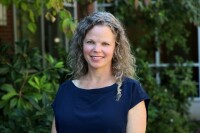 Professor Rebekah Hanley is a long-time faculty member at the University of Oregon School of Law, where she teaches legal writing, professional responsibility, and a new course about generative artificial intelligence (AI) and the legal profession. Before joining the Oregon Law faculty she completed two clerkships, first for a judge in the Central District of California and later for a judge on the Ninth Circuit Court of Appeals. Between her two federal clerkships, Professor Hanley litigated with Munger, Tolles & Olson LLP in Los Angeles. Professor Hanley is Oregon Law’s current Galen Scholar in Legal Writing; in that capacity, she is studying generative AI and its implications for law school teaching and the practice of law. She co-chairs LWI’s new AI Committee and has written and spoken widely on generative AI.
Professor Rebekah Hanley is a long-time faculty member at the University of Oregon School of Law, where she teaches legal writing, professional responsibility, and a new course about generative artificial intelligence (AI) and the legal profession. Before joining the Oregon Law faculty she completed two clerkships, first for a judge in the Central District of California and later for a judge on the Ninth Circuit Court of Appeals. Between her two federal clerkships, Professor Hanley litigated with Munger, Tolles & Olson LLP in Los Angeles. Professor Hanley is Oregon Law’s current Galen Scholar in Legal Writing; in that capacity, she is studying generative AI and its implications for law school teaching and the practice of law. She co-chairs LWI’s new AI Committee and has written and spoken widely on generative AI.
Desmund Wu
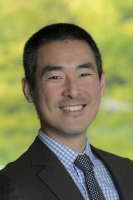 Desmund Wu teaches legal research and writing at the University of Wisconsin Law School. Professor Wu frequently presents on Generative AI, including conducting law firm trainings on generative AI, presenting continuing legal education programs in California and Wisconsin about the ethical use of generative AI, and presenting at legal conferences on how Generative AI is biased.
Desmund Wu teaches legal research and writing at the University of Wisconsin Law School. Professor Wu frequently presents on Generative AI, including conducting law firm trainings on generative AI, presenting continuing legal education programs in California and Wisconsin about the ethical use of generative AI, and presenting at legal conferences on how Generative AI is biased.
Event Flyer
Download the event flyer (PNG).
